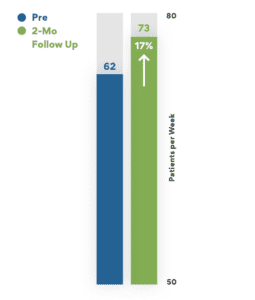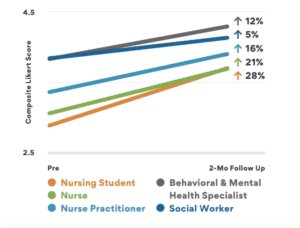Enhancing Interprofessional Education with Virtual Simulation
The interprofessional healthcare model has gained a lot of traction over the last 20 years with the rise of team-based care and the improved outcomes achieved through collaboration.
Interprofessional education (IPE) empowers care teams and students of health with the knowledge and skills necessary for this comprehensive care model. When every professional on the care team has the same foundation of knowledge and clearly defined roles, they are able to provide better patient-centered care that benefits everyone … but how can all care team members stay engaged with the same interprofessional education (IPE) curriculum when they have such diverse specialties? We believe that dynamic, interactive training that involves simulated conversations with virtual patients can be a powerful component of interprofessional education (IPE) that benefits all healthcare team members.
Interprofessional education (IPE) core competencies
The Interprofessional Education Collaborative (IPEC) developed core competencies for interprofessional collaborative practice to build on each profession’s expected disciplinary competencies. These competencies include:
- Values/Ethics
- Roles/Responsibilities
- Interprofessional Communication
- Teams and Teamwork
“The development of interprofessional collaborative competencies necessarily required moving beyond profession-specific educational efforts to engage students of different professions in interactive learning with each other.” – IPEC, Core Competencies for Interprofessional Collaborative Practice: 2016 Update
These four competencies easily apply to all healthcare professionals. If everyone on the care team mastered skills in each competency, just imagine how transformed the patient experience would be. Through new and engaging curriculum, healthcare educators and employers are dedicated to work toward more patient-centered care.
How simulation training can amplify interprofessional education (IPE)
The challenge of interprofessional education is often proximity and logistics. How can you get diverse clinicians together to engage in training? Online training solutions like our interactive simulations can be the answer.
Kognito’s evidence-based role-play simulations prepare clinicians for behavioral health integration using simulated clinical encounters with virtual humans. Learners gain communication skills and clinical knowledge to effectively address their patients’ behavioral health, increase patient engagement, and motivate them to pursue appropriate treatment.

Each simulation introduces the learner to a virtual human with a distinct personality, set of beliefs, engagement level, and chief medical complaint. Before meeting the virtual human, an interactive didactic lesson provides a synopsis of the case, reviews the risk factors and warning signs of possible behavioral health issues, and illustrates the evidence-based communication techniques required to successfully engage a patient in a conversation about their health.
Our proprietary simulation platform integrates research in neuroscience and adult learning, with artificial intelligence and gaming technology to create impactful and engaging experiences with virtual humans.
These experiences lead to proven results. Over a dozen peer-reviewed studies, and real-world results from 75,000+ healthcare providers from a variety of disciplines have empirically proven the efficacy of Kognito’s simulations.

Better patient engagement
Healthcare providers trained with a Kognito simulation engaged more patients in care conversations, helping their institutions demonstrate structural quality improvements, increase reimbursement rates, and deliver improved care to more patients.

Improved competency
A meta-analysis of several studies found that healthcare providers trained with Kognito simulations demonstrated statistically significant (p < 0.05) increases in preparedness and self-efficacy to apply learned skills at follow-up, 2 months post training.
Who can benefit
Healthcare is interdisciplinary, and there’s value in clinicians being able to collaborate with each other to provide the best patient care. To get there, students of different professions need to engage with one another and move beyond profession-specific education efforts.
During Kognito’s simulations, learners assume the role of a virtual clinician. This clinician is designed to be agnostic, so all members of the care team can relate to the scenarios. These healthcare team members may include:
- Nurses
- Nurse practitioners
- Physicians
- Behavioral and mental health specialists
- Social workers
- Allied health professionals
- Pharmacists
- Dentists
Simulation training enhances interprofessional education (IPE) by cultivating collaborative, hands-on practice leading patient encounters with the shared goal of improving health outcomes. When social workers, nurses, physicians, and other clinicians collaborate, they can provide better patient care, improve health outcomes, reduce costs, and address workforce shortages and healthcare disparities.
Experience the power of simulation
If your educational or healthcare institution is committed to preparing health professionals for collaborative care, we’d love for you to learn more about how Kognito’s behavioral health simulations can enhance your efforts. Or better yet, take a demo to see the power of simulation in action.